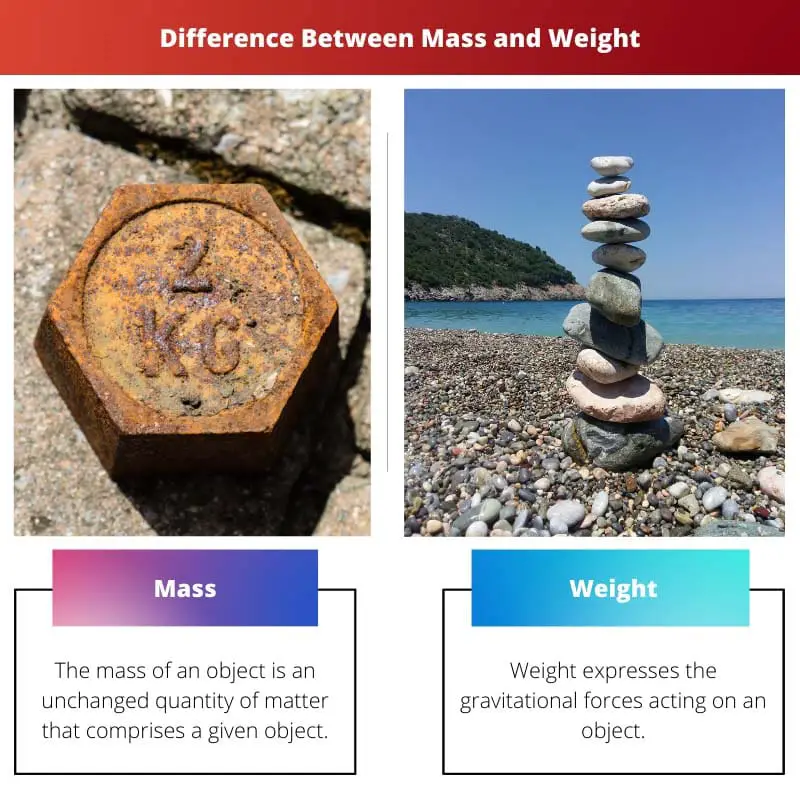Mass is a measure of the amount of matter in an object and remains constant regardless of its location. At the same time, weight is the force exerted on an object due to gravity and varies with the strength of gravity, making it dependent on the object’s location.
Key Takeaways
- Mass is a fundamental property of matter that measures the amount of substance in an object, a remaining constant regardless of the object’s location.
- Weight is the force exerted on an object due to gravity, varying based on its mass and the gravitational force at its location.
- The key difference between mass and weight is that mass is an intrinsic property of an object and remains constant, while weight is a force that depends on both mass and the local gravitational force.
Mass vs Weight
The difference between Mass and Weight is that Mass is a Scalar quantity defined as the amount of matter present in a physical body. Weight is a Vector quantity that is defined as a force exerted on a physical body by gravity with which it is attracted towards the center of the Earth.

Comparison Table
| Feature | Mass | Weight |
|---|---|---|
| Definition | Amount of matter in an object, independent of its location | Force exerted on an object due to gravity |
| Measurement | Kilograms (kg), grams (g) | Newtons (N), pounds (lb) |
| Change with location | Remains constant | Varies depending on the strength of gravity |
| Affected by gravity | Yes, gravity creates the force we experience as weight | Yes, weight is the result of gravity acting on mass |
| Relationship | Weight is proportional to mass, but the constant of proportionality (g) depends on gravity | W = m * g (where W is weight, m is mass, and g is acceleration due to gravity) |
| Applications | Determining the amount of matter in an object, calculating forces in physics, understanding planetary systems | Measuring the force exerted on an object due to gravity, determining safe load limits, understanding everyday experiences like falling objects |
What is Mass?
In physics, mass is a fundamental property of matter that quantifies the amount of substance in an object. It is a scalar quantity, meaning it only has magnitude and no direction. The concept of mass plays a crucial role in classical mechanics, where it is a key parameter in Newton’s laws of motion. Mass is also a central component in Albert Einstein’s theory of relativity, where it is linked to energy through the famous equation E=mc^2.
Types of Mass
There are different types of mass, including:
- Rest Mass: The mass of an object when it is not in motion relative to an observer.
- Relativistic Mass: The mass of an object in motion, as described by the theory of relativity. It increases with velocity.
Units of Measurement
The SI unit for mass is the kilogram (kg). Other common units include grams (g) and metric tons. The mass of an object can be measured using various techniques, such as balances and scales, and it is a fundamental parameter in experimental physics.
Inertia and Gravitational Interaction
Mass is closely associated with inertia, the resistance of an object to changes in its state of motion. Objects with more mass have greater inertia, requiring more force to change their velocity. As described by Isaac Newton’s law of universal gravitation, mass is also a key factor in the gravitational interaction between objects. The force of gravity is directly proportional to the product of the masses of two objects and inversely proportional to the square of the distance between their centers.
Conservation of Mass
In classical mechanics, mass is considered a conserved quantity. This means that in an isolated system, the total mass remains constant over time, regardless of physical or chemical processes occurring within the system. However, in relativistic physics, mass and energy are interconnected, and the conservation of mass-energy supersedes the conservation of mass alone.

What is Weight?
Weight is a fundamental concept in physics and engineering, representing the force exerted on an object due to gravity. It measures the gravitational pull acting on an object’s mass, commonly expressed in units such as newtons or pounds. The weight of an object is directly proportional to its mass, but it varies with the strength of the gravitational field in which the object is located. On Earth, where the gravitational acceleration is relatively constant, weight is used interchangeably with mass in everyday language.
Mathematical Relationship
The relationship between weight (W), mass (m), and gravitational acceleration (g) is defined by Newton’s second law of motion: W=mg, where W is the weight, m is the mass of the object, and g is the gravitational acceleration. This equation signifies that the weight of an object is the product of its mass and the acceleration due to gravity.
Gravitational Variation
Recognizing that weight varies depending on the object’s location within the universe is essential. For instance, an object will weigh less on the Moon than it does on Earth due to the Moon’s weaker gravitational pull. However, the mass of the object remains constant regardless of its location. This distinction is crucial when considering weight in different celestial bodies or during space exploration.
Measurement Units
Weight is measured using different units based on the system of measurement. In the International System of Units (SI), weight is measured in newtons (N), where 1 N is equivalent to the force required to accelerate a 1-kilogram mass at a rate of 1 meter per second squared. In the imperial system, weight is expressed in pounds, with 1 pound approximately equal to 4.448 newtons.

Main Differences Between Mass and Weight
- Definition:
- Mass: Mass measures the amount of matter in an object. It is an intrinsic property and remains constant regardless of the object’s location in the universe.
- Weight: Weight is the force exerted on an object due to gravity. It depends on the object’s mass and the local acceleration due to gravity.
- Units:
- Mass: Mass is measured in kilograms (kg) or grams (g) in the metric system, and in pounds (lb) or ounces (oz) in the imperial system.
- Weight: Weight is measured in newtons (N) in the metric system and pounds (lb) in the imperial system.
- Invariance:
- Mass: Mass remains constant regardless of the object’s location in the universe. An object’s mass on Earth is the same as its mass on the Moon or in deep space.
- Weight: Weight varies with location due to changes in gravitational acceleration. An object will weigh less on the Moon than on Earth, but its mass remains the same.
- Formula:
- Mass: Mass = Weight / Gravity (where gravity is a constant)
- Weight: Weight = Mass × Gravity
- Measurement:
- Mass: Mass is measured using a balance or a scale.
- Weight: Weight is measured using a spring scale or other devices that account for the gravitational force acting on the object.
- Dependence on Location:
- Mass: Independent of location; the mass of an object is the same everywhere.
- Weight: Depends on the local gravitational field strength. An object will weigh less on a planet with lower gravity and more on a planet with higher gravity.

- https://www.chemicool.com/definition/mass.html
- https://sciencing.com/calculate-weight-object-8172507.html

The discussion on mass and its conservation in classical mechanics versus relativistic physics is thought-provoking. It highlights the evolving understanding of mass and energy within the context of modern physics.
Indeed, the explanation of the conservation of mass and mass-energy in classical and relativistic physics provides valuable insights into the ever-evolving nature of scientific concepts.
The comprehensive explanation of mass and its measurements, as well as the gravitational relationship of weight, contributes to a thorough understanding of these essential physics concepts. A well-structured and insightful article overall.
Absolutely, the article provides a cohesive overview of the key differences between mass and weight, while delving into their implications across various physics principles.
The distinction between mass and weight is concisely articulated, providing a clear understanding of these fundamental concepts in physics. The discussion on the gravitational interaction and conservation of mass is particularly intriguing.
The article adeptly explores the interplay of mass, weight, and gravity, shedding light on their interconnectedness and relevance in the study of physics.
Indeed, the coverage of gravitational interaction and conservation of mass offers valuable insights into the complexities of these concepts within the realm of physics.
This article provides an excellent explanation of the difference between mass and weight, as well as how each is measured. The application and types of mass are also well-covered, making it a comprehensive resource for physics enthusiasts.
Absolutely, the detailed information on the different types of mass and the units of measurement makes this article very informative.
I appreciate the clarity and thoroughness of the explanation. It’s enlightening to learn about the relationship between mass and inertia as well.
A thought-provoking discussion of mass and weight, with a focus on their intrinsic properties and gravitational interactions. The mention of mass conservation in classical mechanics versus relativistic physics presents a compelling contrast.
Absolutely, the comparison of mass conservation in classical and relativistic physics offers a stimulating exploration of evolving scientific concepts and principles.
The article effectively outlines the significance of mass and its role in various physics principles, from Newton’s laws to relativity. It’s a valuable resource for those studying or interested in the field of physics.
Absolutely, the detailed explanation of the relationship between mass and inertia, as well as its connection to gravitational interaction, offers a holistic perspective on the concept.
While the article presents clear distinctions between mass and weight, some readers might feel that the mathematical relationship between the two could be explained more comprehensively. Nonetheless, it’s an informative piece overall.
I agree that the mathematical aspect could be expanded further, especially for those seeking a more in-depth understanding of this concept.
I see what you’re saying, but I think the mathematical relationship is adequately explained for a general audience. Perhaps additional details could be included for readers with a deeper interest in physics.
The article’s distinction between mass and weight provides a lucid understanding of these concepts, complemented by a detailed examination of their properties and applications, making it a valuable resource for those interested in physics.
The exploration of mass and weight within the context of physics theory and real-world applications contributes to a well-rounded understanding of these fundamental concepts, creating an insightful and engaging article overall.
Indeed, the article’s comprehensive treatment of the differences between mass and weight, as well as their measurement and relationship with gravity, makes it an insightful read for physics enthusiasts of all levels.
This article offers an in-depth exploration of mass and weight, including their definitions, measurements, and applications in physics. The elucidation of the mathematical relationship between the two is particularly illuminating.
Indeed, the detailed explanation of mass and weight, alongside their mathematical relationship and real-world applications, makes this article an enriching resource for those interested in physics.
The article’s elucidation of weight as a force due to gravity and its mathematical relationship with mass is enlightening. The real-world applications of this concept further enhance its relevance.
Definitely, the emphasis on the gravitational relationship between mass and weight and its role in understanding everyday phenomena is both engaging and educational.